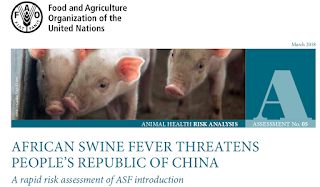 | |
| LINK |
#13,596
Although Chinese media continues to report unconfirmed (and in some cases, officially denied) rumors of swine die offs from other provinces, for the first half of October only one (Tianjin) African Swine Fever outbreak has been officially reported outside of Liaoning Province.
Today Panjin City reports two farms infected, while Jinzhou City reports 1 outbreak in a farm with nearly 20,000 pigs.This translated report from China's Ministry of Agriculture.
African swine fever epidemic in Panjin City, Jinzhou City, Liaoning Province
Date: 2018-10-15 16:06 Author: Source: Ministry of Agriculture and Rural Press Office
The Information Office of the Ministry of Agriculture and Rural Affairs released on October 15th, and three African swine fever epidemics occurred in Jinzhou City and Panjin City of Liaoning Province.
On October 14, the Ministry of Agriculture and Rural Areas received a report from the China Animal Disease Prevention and Control Center and was diagnosed by the China Center for Animal Health and Epidemiology (National Center for Animal Disease Research). Beizhen City, Jinzhou City, Liaoning Province, Datun District, Panjin City
The three farms have had African swine fever. Among them, a farm in Beizhen City, Jinzhou City, had 19938 pigs, 221 cases, and 221 deaths; a farmer in Shuguang Village, Wangjia Street, Datun District, Panjin City, had 1,571 live pigs, 109 diseases, 109 deaths; Panjin City A farmer in Wangjia Village, Wangjia Street, Datun District has 270 live pigs, with 129 cases and 129 deaths.
Immediately after the outbreak, the Ministry of Agriculture and Rural Affairs sent a steering group to the local area. The local government has started the emergency response mechanism as required, and adopted measures such as blockade, culling, harmless treatment, disinfection, etc., to treat all the sick and culled pigs harmlessly. At the same time, all live pigs and susceptible animals and products are prohibited from entering or leaving the blockade. At present, the above epidemic has been effectively disposed of.
While ASF does not pose a direct threat to human health, it represents a serious threat to the pork industry, local economies, and even to food security for some nations.